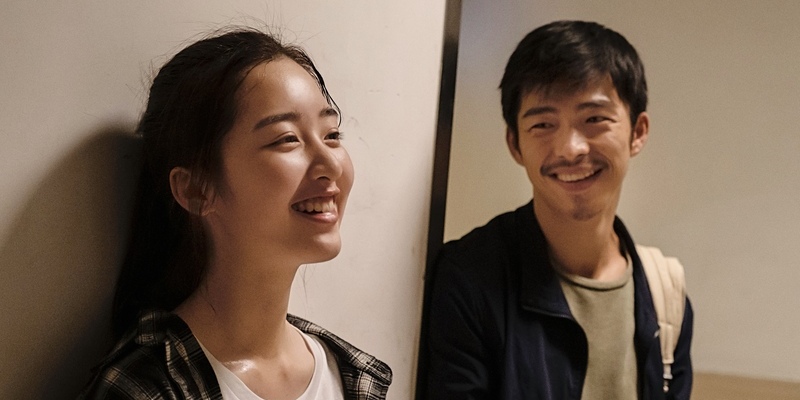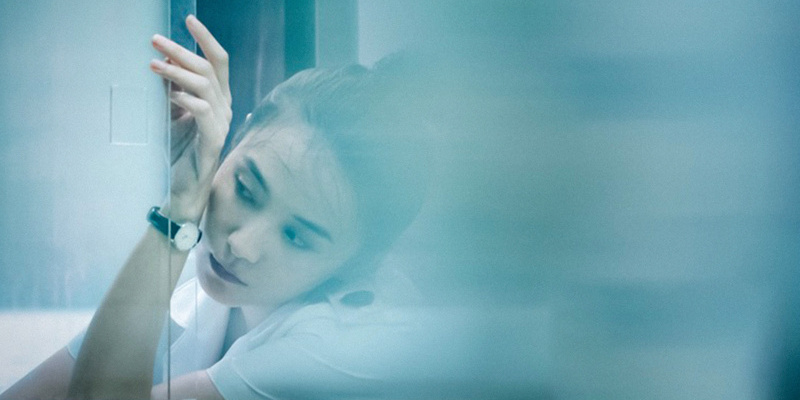
Returning to his hometown after being wrongly accused of murder, a man
rekindles a romance with an old classmate.
Review by
Benjamin Poole
Directed by: Li Xiaofeng
Starring: Zhang Yu, Song Jia, Wang Yanhui, Lee Hong-Chi

Childishly, when reviewing a Chinese film, I am always thrilled by the
obligatory title card which appears at the start. A fanfare introduces an
imperious colour scheme of emerald, scarlet and gold which constitutes a
dragon, film strips and the bi-lingual legend "China Film Administration"
- wow! Of course, as any fule kno, this impressive state branding
ultimately explicates the strict control which the Publicity Department of
the Chinese Communist Party exerts over films made and, indeed, exhibited
in the country. And while it is in rather bad taste from my liberated
western privilege (viz. the gay Chinese kids whose sexuality and
alienation has no reassuring representation, for example), I do like the
pomp and the ceremony of it all: this is a film that has been Taken
Seriously.
Moreover, the title card is a northern star for the film's ideologies and
purpose, which often pertains to China itself. In the case of
Back to the Wharf, Xiaofeng Li (director) and Xin Yu's (writer) enjoyable
melodrama, the narrative concerns the return of its besieged protagonist
to his hometown after 15 years in isolation following a tragic accident,
but the themes duly implicate the industrialisation of China, insidious
capitalism and the partisan nature of authority.

In its opening, schoolboy Song Hao (Yu Zhang, eventually) is all
excited about his upcoming scholarship to college; a reward which he has
grafted for over the years. At the top of his class, Song Hao counts on
further education as an escape from the confines of his small town.
Problem is, the place ends up being given to his mate Li Tang, who just
happens to be the son of the local mayor... Pull the other one,
Headmaster. It's got zhongs on.
Song Hao is understandably fuming and, in a youthful flush of
hot-headedness, peddles off on his little BMX to confront the mayor. He
only ends up going into the wrong house, though, and, after a struggle
with a bloke who thinks he's a burglar, ends up accidentally murdering him
to death with a knife. Song Hao accordingly undergoes a literal escape,
where he flees to another part of the country as an industrial labourer (a
brutal opposition to his academic aspirations, implying the probable
destiny of most poor Chinese kids), only returning 15 years later when
news of his mother's death reaches him.

Upon his recrudescence, it turns out Li Tang has become an evil property
developer (is there any other kind?) in a killer purple suit which
markedly contrasts Song Hao's utilitarian garb (seriously, what a suit:
after the film I spent ages looking for a similar one online to no luck.
Very exclusive, it seems). Furthermore, Sang Hao's dad is in hock to Ling
Tan, who has given him a lucrative promotion. Ling Tan also has plans to
demolish the tower block where Wan Xiaoning, the victim's now grown-up
daughter orphaned by Song Hao a decade and a half ago, lives. Finally,
Ling Tan knew all along what happened that night, as does Song Hao's dad,
giving way to a febrile atmosphere of shade and compromise.
It's not all bad though, as, thrown into the melodramatic mix is Pan
Xiaoshuang (Song Jia - very funny and beautiful), who has held a
candle for Song Hao ever since she saw him years ago, shell suit jacket
discarded due to blood stains, wailing topless into the pathetic fallacy
storm of that fateful evening. Pan Xiaoshuang's long held love is another
hangover from the murder, a further suggestion that one man's inadvertent
adolescent actions have directly sealed the collective fate of the town. A
(more) downbeat It's a Wonderful Life, in a way.

For a film predicated on soapy interaction,
Back to the Wharf never skimps on visual pleasure.
Throughout, the film feels and looks epic in scope, especially at the
start, where the use of circumscribed space and the agitated motions of
its characters create a sensation of tight systemisation. In the latter
half, Song Hao wanders inert through the visibly developing landscape,
acted upon by Ling Tan and Pan Xiaoshuang. He is a man whose circumstances
have rendered him an NPC in a world of movers and shakers. In this part of
the film, Back to the Wharf occasionally mirrors the
aimlessness of its main character, and as we trudge inexorably towards the
film's bleak ending the drama doesn't quite have the thriller urgency of
the opening hour.
However, Xiaofeng Li and Xin Yu's film does dare to challenge CCP
orthodoxy: the headmaster reasons with the young Song Hao that he
"prioritises the collective over the individual" when really he's just
keeping the mayor sweet, and Ling Tan's data is "state approved," which
implies a federal complicity with his avaricious designs. This working
within the lines is both subtle and bold: a final title card appears
before the credits, informing us in a bloated rush of text that the real
villains were counteracted, Poochie died on the way back to his home
planet, and Everything Is Alright. Surely mandated, this interference
contradicts the events of Back to the Wharf's final reel, but in doing so inadvertently consolidates the film's
philosophy of unjust and heedless regulation.

Back to the Wharf is on US VOD from
January 17th. A UK/ROI release has yet to be announced.

